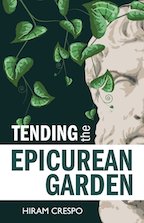Tend Your Garden
 Tending the Epicurean Garden by Hiram Crespo. Humanist Press, 2014,
Tending the Epicurean Garden by Hiram Crespo. Humanist Press, 2014,
Hiram Crespo is engaged in the challenging task of reviving Epicureanism not just as a philosophy but also as a living practice. His book, Tending the Epicurean Garden, combines the ancient philosophy of Epicurus with tasks or practices, many of them borrowed from Buddhism. One question for secular Buddhists is whether Buddhism itself (minus the supernatural elements) is not enough. What insights are missing the Epicureanism might satisfy?
Epicurus was a Greek philosopher who flourished in the 3rd century BCE. He founded a school that persisted until suppressed by the Christian emperors of the later Roman Empire. Rather than simply being a system of thought, Epicureanism was a pragmatic philosophy that combined ideas with concrete practices.
Unfortunately, little was preserved of the writings of Epicurus except in fragments quoted by other ancient writers. As Crespo describes it, the ultimate goal of the Epicurean is abiding pleasure, a low-arousal or tranquil sense of pleasure that is imperturbable in the face of adversity. This pleasure of just being should be distinguished from dynamic pleasure, the high-arousal pleasure of doing. Our contemporary society is organized around the marketing of high-arousal pleasures (that was awesome, dude!) that produce peaks of joy that an inevitably followed by troughs. We end up running on a hedonic treadmill trying to recapture the peak experiences. The confusion over these two types of pleasure have even lead to the word “epicurean” being redefined to mean pursuing luxurious pleasure when in fact the original philosophy advocated for a much simpler way to enjoy life.
In many ways, this philosophy seems similar to Buddhism. Epicureans focus more on finding abiding pleasure rather than eliminating suffering, though arguably these are very similar states of mind. Compared to Buddhism, there seems to be more a cognitive component to Epicureanism, which encourages retrospection and life analysis with a sense of kindness.
Epicureans also emphasize prudence and self-reliance. Crespo even gives recommendations on achieving financial independence and staying out of debt. There is also an emphasis on friendship, which might make Epicureans more social than a Buddhist sangha. However, Epicureans tended to withdraw from society and tend their own garden (Voltaire’s allusion in Candide is to this Epicurean approach). Epicureans also practice suavity, or kind but frank speech.
Although a good amount of the ideas of Epicurus have survived in fragments of text, the practices themselves went extinct or were altered when Epicureanism was suppressed in late antiquity. Crespo writes that the Roman Catholic practice of confession may have been inspired by Epicurean practices of introspection. Crespo finds some contemporary practices to be consistent his understanding of Epicurean practices, and recommends journaling, gratitude practices, affirmations and especially meditation.
Having himself practiced Zen meditation, Crespo borrows much from Buddhist practice for his neo-Epicureanism. Indeed, his approach reminds me of proposals to resurrect the wooly mammoth by injecting preserved fragments of mammoth DNA into the egg of live elephant. The resulting mammophant would not be an exactly replica of a wooly mammoth, but it would be the closest anyone living has ever seen. Reviving Epicureanism may seem like a long shot, but the rise of neo-Paganism suggests that it may not be a fool’s errand.
The book presents complex material, clearly written. From the perspective of the secular Buddhist, one question not directly addressed is, given that Crespo draws so much from Buddhism, why do we need another “ism,” another label, rather than say a secular Buddhism with an Epicurean twist? Perhaps it’s best not to quibble about labels. Secular Buddhists can clearly benefit from allowing another stream of ancient wisdom to flow into this emerging project of seeking abiding tranquility and the end of suffering.
